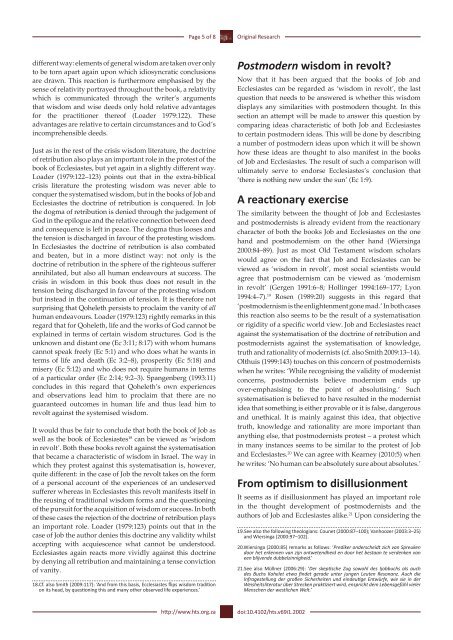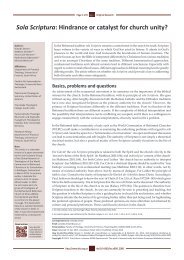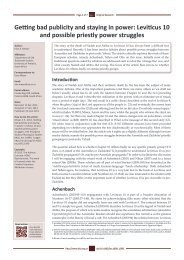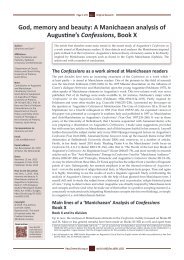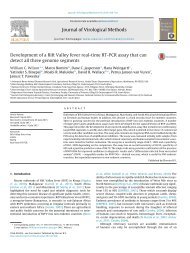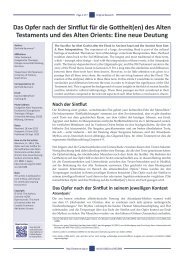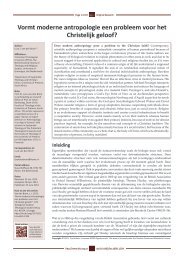Job and Ecclesiastes as (postmodern?) - HTS Teologiese Studies ...
Job and Ecclesiastes as (postmodern?) - HTS Teologiese Studies ...
Job and Ecclesiastes as (postmodern?) - HTS Teologiese Studies ...
Create successful ePaper yourself
Turn your PDF publications into a flip-book with our unique Google optimized e-Paper software.
Page 5 of 8<br />
Original Research<br />
different way: elements of general wisdom are taken over only<br />
to be torn apart again upon which idiosyncratic conclusions<br />
are drawn. This reaction is furthermore emph<strong>as</strong>ised by the<br />
sense of relativity portrayed throughout the book, a relativity<br />
which is communicated through the writer’s arguments<br />
that wisdom <strong>and</strong> wise deeds only hold relative advantages<br />
for the practitioner thereof (Loader 1979:122). These<br />
advantages are relative to certain circumstances <strong>and</strong> to God’s<br />
incomprehensible deeds.<br />
Just <strong>as</strong> in the rest of the crisis wisdom literature, the doctrine<br />
of retribution also plays an important role in the protest of the<br />
book of <strong>Ecclesi<strong>as</strong>tes</strong>, but yet again in a slightly different way.<br />
Loader (1979:122–123) points out that in the extra-biblical<br />
crisis literature the protesting wisdom w<strong>as</strong> never able to<br />
conquer the systematised wisdom, but in the books of <strong>Job</strong> <strong>and</strong><br />
<strong>Ecclesi<strong>as</strong>tes</strong> the doctrine of retribution is conquered. In <strong>Job</strong><br />
the dogma of retribution is denied through the judgement of<br />
God in the epilogue <strong>and</strong> the relative connection between deed<br />
<strong>and</strong> consequence is left in peace. The dogma thus looses <strong>and</strong><br />
the tension is discharged in favour of the protesting wisdom.<br />
In <strong>Ecclesi<strong>as</strong>tes</strong> the doctrine of retribution is also combated<br />
<strong>and</strong> beaten, but in a more distinct way: not only is the<br />
doctrine of retribution in the sphere of the righteous sufferer<br />
annihilated, but also all human endeavours at success. The<br />
crisis in wisdom in this book thus does not result in the<br />
tension being discharged in favour of the protesting wisdom<br />
but instead in the continuation of tension. It is therefore not<br />
surprising that Qoheleth persists to proclaim the vanity of all<br />
human endeavours. Loader (1979:123) rightly remarks in this<br />
regard that for Qoheleth, life <strong>and</strong> the works of God cannot be<br />
explained in terms of certain wisdom structures. God is the<br />
unknown <strong>and</strong> distant one (Ec 3:11; 8:17) with whom humans<br />
cannot speak freely (Ec 5:1) <strong>and</strong> who does what he wants in<br />
terms of life <strong>and</strong> death (Ec 3:2–8), prosperity (Ec 5:18) <strong>and</strong><br />
misery (Ec 5:12) <strong>and</strong> who does not require humans in terms<br />
of a particular order (Ec 2:14; 9:2–3). Spangenberg (1993:11)<br />
concludes in this regard that Qoheleth’s own experiences<br />
<strong>and</strong> observations lead him to proclaim that there are no<br />
guaranteed outcomes in human life <strong>and</strong> thus lead him to<br />
revolt against the systemised wisdom.<br />
It would thus be fair to conclude that both the book of <strong>Job</strong> <strong>as</strong><br />
well <strong>as</strong> the book of <strong>Ecclesi<strong>as</strong>tes</strong> 18 can be viewed <strong>as</strong> ‘wisdom<br />
in revolt’. Both these books revolt against the systematisation<br />
that became a characteristic of wisdom in Israel. The way in<br />
which they protest against this systematisation is, however,<br />
quite different: in the c<strong>as</strong>e of <strong>Job</strong> the revolt takes on the form<br />
of a personal account of the experiences of an undeserved<br />
sufferer where<strong>as</strong> in <strong>Ecclesi<strong>as</strong>tes</strong> this revolt manifests itself in<br />
the reusing of traditional wisdom forms <strong>and</strong> the questioning<br />
of the pursuit for the acquisition of wisdom or success. In both<br />
of these c<strong>as</strong>es the rejection of the doctrine of retribution plays<br />
an important role. Loader (1979:123) points out that in the<br />
c<strong>as</strong>e of <strong>Job</strong> the author denies this doctrine any validity whilst<br />
accepting with acquiescence what cannot be understood.<br />
<strong>Ecclesi<strong>as</strong>tes</strong> again reacts more vividly against this doctrine<br />
by denying all retribution <strong>and</strong> maintaining a tense conviction<br />
of vanity.<br />
18.Cf. also Smith (2009:117): ‘And from this b<strong>as</strong>is, <strong>Ecclesi<strong>as</strong>tes</strong> flips wisdom tradition<br />
on its head, by questioning this <strong>and</strong> many other observed life experiences.’<br />
Postmodern wisdom in revolt?<br />
Now that it h<strong>as</strong> been argued that the books of <strong>Job</strong> <strong>and</strong><br />
<strong>Ecclesi<strong>as</strong>tes</strong> can be regarded <strong>as</strong> ‘wisdom in revolt’, the l<strong>as</strong>t<br />
question that needs to be answered is whether this wisdom<br />
displays any similarities with <strong>postmodern</strong> thought. In this<br />
section an attempt will be made to answer this question by<br />
comparing ide<strong>as</strong> characteristic of both <strong>Job</strong> <strong>and</strong> <strong>Ecclesi<strong>as</strong>tes</strong><br />
to certain <strong>postmodern</strong> ide<strong>as</strong>. This will be done by describing<br />
a number of <strong>postmodern</strong> ide<strong>as</strong> upon which it will be shown<br />
how these ide<strong>as</strong> are thought to also manifest in the books<br />
of <strong>Job</strong> <strong>and</strong> <strong>Ecclesi<strong>as</strong>tes</strong>. The result of such a comparison will<br />
ultimately serve to endorse <strong>Ecclesi<strong>as</strong>tes</strong>’s conclusion that<br />
‘there is nothing new under the sun’ (Ec 1:9).<br />
A reactionary exercise<br />
The similarity between the thought of <strong>Job</strong> <strong>and</strong> <strong>Ecclesi<strong>as</strong>tes</strong><br />
<strong>and</strong> <strong>postmodern</strong>ists is already evident from the reactionary<br />
character of both the books <strong>Job</strong> <strong>and</strong> <strong>Ecclesi<strong>as</strong>tes</strong> on the one<br />
h<strong>and</strong> <strong>and</strong> <strong>postmodern</strong>ism on the other h<strong>and</strong> (Wiersinga<br />
2000:84–89). Just <strong>as</strong> most Old Testament wisdom scholars<br />
would agree on the fact that <strong>Job</strong> <strong>and</strong> <strong>Ecclesi<strong>as</strong>tes</strong> can be<br />
viewed <strong>as</strong> ‘wisdom in revolt’, most social scientists would<br />
agree that <strong>postmodern</strong>ism can be viewed <strong>as</strong> ‘modernism<br />
in revolt’ (Gergen 1991:6–8; Hollinger 1994:169–177; Lyon<br />
1994:4–7). 19 Rosen (1989:20) suggests in this regard that<br />
‘<strong>postmodern</strong>ism is the enlightenment gone mad.’ In both c<strong>as</strong>es<br />
this reaction also seems to be the result of a systematisation<br />
or rigidity of a specific world view. <strong>Job</strong> <strong>and</strong> <strong>Ecclesi<strong>as</strong>tes</strong> react<br />
against the systematisation of the doctrine of retribution <strong>and</strong><br />
<strong>postmodern</strong>ists against the systematisation of knowledge,<br />
truth <strong>and</strong> rationality of modernists (cf. also Smith 2009:13–14).<br />
Olthuis (1999:143) touches on this concern of <strong>postmodern</strong>ists<br />
when he writes: ‘While recognising the validity of modernist<br />
concerns, <strong>postmodern</strong>ists believe modernism ends up<br />
over-emph<strong>as</strong>ising to the point of absolutising.’ Such<br />
systematisation is believed to have resulted in the modernist<br />
idea that something is either provable or it is false, dangerous<br />
<strong>and</strong> unethical. It is mainly against this idea, that objective<br />
truth, knowledge <strong>and</strong> rationality are more important than<br />
anything else, that <strong>postmodern</strong>ists protest – a protest which<br />
in many instances seems to be similar to the protest of <strong>Job</strong><br />
<strong>and</strong> <strong>Ecclesi<strong>as</strong>tes</strong>. 20 We can agree with Kearney (2010:5) when<br />
he writes: ‘No human can be absolutely sure about absolutes.’<br />
From optimism to disillusionment<br />
It seems <strong>as</strong> if disillusionment h<strong>as</strong> played an important role<br />
in the thought development of <strong>postmodern</strong>ists <strong>and</strong> the<br />
authors of <strong>Job</strong> <strong>and</strong> <strong>Ecclesi<strong>as</strong>tes</strong> alike. 21 Upon considering the<br />
19.See also the following theologians: Counet (2000:87–100); Vanhoozer (2003:3–25)<br />
<strong>and</strong> Wiersinga (2000:97–102).<br />
20.Wiersinga (2000:85) remarks <strong>as</strong> follows: ‘Prediker onderscheidt zich van Spreuken<br />
door het erkennen van zijn ontwetendheid en door het bestaan te verdenken van<br />
een blijvende dubbelzinnigheid.’<br />
21.See also Müllner (2006:29): ‘Der skeptische Zug sowohl des Ijobbuchs als auch<br />
des Buchs Kohelet etwa findet gerade unter jungen Leuten Resonanz. Auch die<br />
Infragestellung der groβen Sicherheiten und eindeutige Entwürfe, wie sie in der<br />
Weisheitsliteratur über Strecken praktiziert wird, enspricht dem Lebensgefühl vieler<br />
Menschen der westlichen Welt.’<br />
http://www.hts.org.za<br />
doi:10.4102/hts.v69i1.2002


